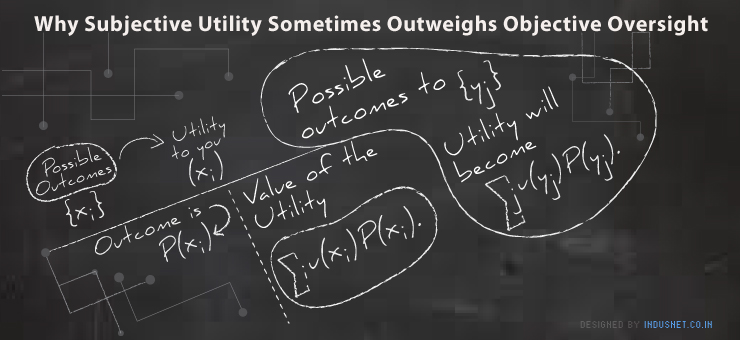
Subjective expected utility is a method developed by L. J. Savage in 1954. It makes an attempt to gauge and minimize the risks involved in decision-making. This mathematical approach is a novel method and a sober, calculative one that facilitates you in the prompt addressal of the threat of risks looming large in respect to your deemed business. This can help you in coming up with a promising choice from a wide variety of inessential, low performing, unfruitful and unyielding items aiding you in achieving your cherished goals.
Subjective utility in mathematical terms
Subjective utility is the summation of the utility function of the possibility of outcomes and the probability distribution multiplied. The theory of subjective expected utility combines two subjective concepts: first, a personal utility function, and second a personal probability distribution (based on Bayesian probability theory).
It was proved that, if you adhere to axioms of rationality, if you believe an uncertain event has possible outcomes {xi} each with a utility to you of (xi) ,then your choices can be explained as arising from a function in which you believe that the subjective probability of each outcome is P(xi) , and your subjective expected utility is the expected value of the utility,.
You may be able to make a decision which can change the possible outcomes to {yj},in which case your subjective utility will become .
Which decision you prefer depends on which subjective expected utility is higher. The type of decision taken solely rests on the person who takes it, as different people may arrive at different utility functions and different outcomes according to their perspectives and thus, different probabilities.
How is probability measured?
To help you have a vague idea about probability, it is very essential for you to have a look at this analogy of throwing a dice. A dice thrown has a property of delivering six possible outcomes. The probables have a possibility of resulting in a wide array of numbers from 1 to 6. A roll of the dice, thus, has a probability of 1/6 or in a rounded up decimal of 0.17. As you can see, the higher the outcome the lower is the probability and the lower the outcome, the higher is the probability. Thus, the resulting number can be a measure of the probability and can help you in deciding choices for your digital marketing campaign.
Objective oversight
Objective oversight or the process of overseeing and tracking the objectives to ensure that they attain the desired goal is essential for a digital marketing campaign. This can aid in the materialization of high yielding conversions. Objective oversight might seem frivolous, but it is essential to keep your marketing campaign on a short leash and make it worthwhile. Dependency on objective oversight to provide an effective strategy is advised, but it should not negate the fact that subjective utility is more crucial to a successful campaign.
Why does one outweigh the other?
As the objectives you are going to attain, depends on the variable involved in the subjective utility, objective oversight is not more important or independent and is closely dependent on subjective utility. In simple words, the choices that you are going to make, which seem to you as promising ones for your digital marketing campaign are practically responsible in deciding the course of the objectives that you have listed. It is important that you oversee whether the objectives that you listed are attained and are not deviating in the whole process of digital marketing and that they wholly depend on the right choice of the items that you are going to make.
For example, if you are planning to choose from a large database of keywords, you need to pick a keyword that scores more on subjective utility. Take into account all the possible outcomes with each utility and carefully arrive at a subjective utility that stands out, and the one that has a highest score proves promising for your digital marketing campaign.
You need to oversee that the keywords are thoroughly and perfectly checked and utilized to satisfy your interests in the attaining of your objectives that can result in conversions, but you need to remember that the choice of keywords you make based on the subjective utility score, are solely responsible in determining or resulting in conversions.